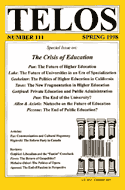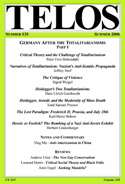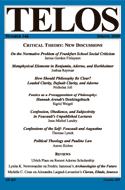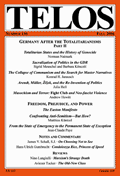By Marcus Michelsen · Tuesday, January 19, 2010 Each Tuesday in the TELOSscope blog, we reach back into the archives and highlight an article whose critical insights continue to illuminate our thinking and challenge our assumptions. Today, Marcus Michelsen looks at Valerie Allen and Ares Axiotis’s article “Nietzsche on the Future of Education,” from Telos 111 (Spring 1998).
 If someone were to ask me the question “What is authoritative?” I might as well say, “I am. What I give my assent to has authority in my life.” Though true if one admits that for authority to manifest itself it must be recognized by someone, and for something to become authoritative in my life it requires just such a manifestation to me; still, this turns the question around. If I am pursued by the following question “How do I recognize what I should assent to?” the Enlightenment provides me with the answer: “Reason. Reason has authority in our lives. History itself testifies to the reason that formed it in the decisions of great men and in freedom, the spirit of the people. Moreover, to be enlightened means precisely to be in possession of reason.” There are, however, reasons to suppose that such an answer is suspicious, and that the Enlightenment, by glorifying itself, leads us astray. What if, in the belief that authority comes from reason, we have got it wrong? If someone were to ask me the question “What is authoritative?” I might as well say, “I am. What I give my assent to has authority in my life.” Though true if one admits that for authority to manifest itself it must be recognized by someone, and for something to become authoritative in my life it requires just such a manifestation to me; still, this turns the question around. If I am pursued by the following question “How do I recognize what I should assent to?” the Enlightenment provides me with the answer: “Reason. Reason has authority in our lives. History itself testifies to the reason that formed it in the decisions of great men and in freedom, the spirit of the people. Moreover, to be enlightened means precisely to be in possession of reason.” There are, however, reasons to suppose that such an answer is suspicious, and that the Enlightenment, by glorifying itself, leads us astray. What if, in the belief that authority comes from reason, we have got it wrong?
Continue reading →
By Marcus Michelsen · Tuesday, November 17, 2009 Each Tuesday in the TELOSscope blog, we reach back into the archives and highlight an article whose critical insights continue to illuminate our thinking and challenge our assumptions. Today, Marcus Michelsen looks at Todd Samuel Presner’s “Heidegger, Arendt, and the Modernity of Mass Death,” from Telos 135 (Summer 2006).
 We are all going to die. Of course, this is a platitude. Is death a social or a personal event? It is a strange point of intersection where an inexpressibly personal experience gives expression to meaning for the group. A meaning that is enjoyed or suffered by people who, in a very clear sense, are not taking part in the very event that serves as its point of origin. Whose event, then, is my death? This question becomes irrelevant in the face of mass death, because, here, my death ceases to be a singular event. It is buried in a crowd, innumerable through the multiplication of the killed—my life and my death are both stolen from me. How are we to think of this other kind of death? We are all going to die. Of course, this is a platitude. Is death a social or a personal event? It is a strange point of intersection where an inexpressibly personal experience gives expression to meaning for the group. A meaning that is enjoyed or suffered by people who, in a very clear sense, are not taking part in the very event that serves as its point of origin. Whose event, then, is my death? This question becomes irrelevant in the face of mass death, because, here, my death ceases to be a singular event. It is buried in a crowd, innumerable through the multiplication of the killed—my life and my death are both stolen from me. How are we to think of this other kind of death?
Continue reading →
By Marcus Michelsen · Tuesday, October 27, 2009 Each Tuesday in the TELOSscope blog, we reach back into the archives and highlight an article whose critical insights continue to illuminate our thinking and challenge our assumptions. Today, Marcus Michelson looks at Jean-Michel Landry’s “Confession, Obedience, and Subjectivity: Michel Foucault’s Unpublished Lectures On the Government of the Living,” from Telos 146 (Spring 2009).
 Why do we obey? Even when people rebel, it seems they simply reconstitute a form of obedience. We all know the old cliché “they aren’t rebels, they’re just following a ‘rebellious’ social code.” The way people dress, their hairstyle, tattoos, earrings, piercings, etc., only seem to reinforce our belief in their obedience to well-defined social practices. Even if we aren’t all playing by the same rules, we are all playing by rules. Do we even know what it would mean anymore to rebel? In the meantime, cultural critics admonish our decline, criticizing us for adhering to more philistine, insipid, or self-defeating values. But doesn’t this criticism amount to saying that we are just obeying the wrong thing, whereas obedience itself is simply presupposed? Could obedience really be ubiquitous, and if so, how did we get this way? On the other hand, how can we describe a legitimate form of autonomy? Why do we obey? Even when people rebel, it seems they simply reconstitute a form of obedience. We all know the old cliché “they aren’t rebels, they’re just following a ‘rebellious’ social code.” The way people dress, their hairstyle, tattoos, earrings, piercings, etc., only seem to reinforce our belief in their obedience to well-defined social practices. Even if we aren’t all playing by the same rules, we are all playing by rules. Do we even know what it would mean anymore to rebel? In the meantime, cultural critics admonish our decline, criticizing us for adhering to more philistine, insipid, or self-defeating values. But doesn’t this criticism amount to saying that we are just obeying the wrong thing, whereas obedience itself is simply presupposed? Could obedience really be ubiquitous, and if so, how did we get this way? On the other hand, how can we describe a legitimate form of autonomy?
Continue reading →
By Marcus Michelsen · Tuesday, September 29, 2009 Each Tuesday in the TELOSscope blog, we reach back into the archives and highlight an article whose critical insights continue to illuminate our thinking and challenge our assumptions. Today, Marcus Michelsen looks at Jean-Claude Paye’s “From the State of Emergency to the Permanent State of Exception,” from Telos 136 (Fall 2006).
 How long ago was 9/11? Is this really a new era? What does it look like? For many, for perhaps all of us, the terrorist attacks eight years ago came as a surprise and brought us to question our understanding of the world around us. Our answers have emerged in renewed and reinvigorated passions for social and international justice. Collectively, however, there is no one vision we can all subscribe to. Some blame the United States for the terrorist attacks; others call for the government to hunt down the terrorists and kill them. In the heat of the moment, emotions flare and opinions are erratic. How long ago was 9/11? Is this really a new era? What does it look like? For many, for perhaps all of us, the terrorist attacks eight years ago came as a surprise and brought us to question our understanding of the world around us. Our answers have emerged in renewed and reinvigorated passions for social and international justice. Collectively, however, there is no one vision we can all subscribe to. Some blame the United States for the terrorist attacks; others call for the government to hunt down the terrorists and kill them. In the heat of the moment, emotions flare and opinions are erratic.
Continue reading →
|
|
 If someone were to ask me the question “What is authoritative?” I might as well say, “I am. What I give my assent to has authority in my life.” Though true if one admits that for authority to manifest itself it must be recognized by someone, and for something to become authoritative in my life it requires just such a manifestation to me; still, this turns the question around. If I am pursued by the following question “How do I recognize what I should assent to?” the Enlightenment provides me with the answer: “Reason. Reason has authority in our lives. History itself testifies to the reason that formed it in the decisions of great men and in freedom, the spirit of the people. Moreover, to be enlightened means precisely to be in possession of reason.” There are, however, reasons to suppose that such an answer is suspicious, and that the Enlightenment, by glorifying itself, leads us astray. What if, in the belief that authority comes from reason, we have got it wrong?
If someone were to ask me the question “What is authoritative?” I might as well say, “I am. What I give my assent to has authority in my life.” Though true if one admits that for authority to manifest itself it must be recognized by someone, and for something to become authoritative in my life it requires just such a manifestation to me; still, this turns the question around. If I am pursued by the following question “How do I recognize what I should assent to?” the Enlightenment provides me with the answer: “Reason. Reason has authority in our lives. History itself testifies to the reason that formed it in the decisions of great men and in freedom, the spirit of the people. Moreover, to be enlightened means precisely to be in possession of reason.” There are, however, reasons to suppose that such an answer is suspicious, and that the Enlightenment, by glorifying itself, leads us astray. What if, in the belief that authority comes from reason, we have got it wrong?  We are all going to die. Of course, this is a platitude. Is death a social or a personal event? It is a strange point of intersection where an inexpressibly personal experience gives expression to meaning for the group. A meaning that is enjoyed or suffered by people who, in a very clear sense, are not taking part in the very event that serves as its point of origin. Whose event, then, is my death? This question becomes irrelevant in the face of mass death, because, here, my death ceases to be a singular event. It is buried in a crowd, innumerable through the multiplication of the killed—my life and my death are both stolen from me. How are we to think of this other kind of death?
We are all going to die. Of course, this is a platitude. Is death a social or a personal event? It is a strange point of intersection where an inexpressibly personal experience gives expression to meaning for the group. A meaning that is enjoyed or suffered by people who, in a very clear sense, are not taking part in the very event that serves as its point of origin. Whose event, then, is my death? This question becomes irrelevant in the face of mass death, because, here, my death ceases to be a singular event. It is buried in a crowd, innumerable through the multiplication of the killed—my life and my death are both stolen from me. How are we to think of this other kind of death?  Why do we obey? Even when people rebel, it seems they simply reconstitute a form of obedience. We all know the old cliché “they aren’t rebels, they’re just following a ‘rebellious’ social code.” The way people dress, their hairstyle, tattoos, earrings, piercings, etc., only seem to reinforce our belief in their obedience to well-defined social practices. Even if we aren’t all playing by the same rules, we are all playing by rules. Do we even know what it would mean anymore to rebel? In the meantime, cultural critics admonish our decline, criticizing us for adhering to more philistine, insipid, or self-defeating values. But doesn’t this criticism amount to saying that we are just obeying the wrong thing, whereas obedience itself is simply presupposed? Could obedience really be ubiquitous, and if so, how did we get this way? On the other hand, how can we describe a legitimate form of autonomy?
Why do we obey? Even when people rebel, it seems they simply reconstitute a form of obedience. We all know the old cliché “they aren’t rebels, they’re just following a ‘rebellious’ social code.” The way people dress, their hairstyle, tattoos, earrings, piercings, etc., only seem to reinforce our belief in their obedience to well-defined social practices. Even if we aren’t all playing by the same rules, we are all playing by rules. Do we even know what it would mean anymore to rebel? In the meantime, cultural critics admonish our decline, criticizing us for adhering to more philistine, insipid, or self-defeating values. But doesn’t this criticism amount to saying that we are just obeying the wrong thing, whereas obedience itself is simply presupposed? Could obedience really be ubiquitous, and if so, how did we get this way? On the other hand, how can we describe a legitimate form of autonomy?  How long ago was 9/11? Is this really a new era? What does it look like? For many, for perhaps all of us, the terrorist attacks eight years ago came as a surprise and brought us to question our understanding of the world around us. Our answers have emerged in renewed and reinvigorated passions for social and international justice. Collectively, however, there is no one vision we can all subscribe to. Some blame the United States for the terrorist attacks; others call for the government to hunt down the terrorists and kill them. In the heat of the moment, emotions flare and opinions are erratic.
How long ago was 9/11? Is this really a new era? What does it look like? For many, for perhaps all of us, the terrorist attacks eight years ago came as a surprise and brought us to question our understanding of the world around us. Our answers have emerged in renewed and reinvigorated passions for social and international justice. Collectively, however, there is no one vision we can all subscribe to. Some blame the United States for the terrorist attacks; others call for the government to hunt down the terrorists and kill them. In the heat of the moment, emotions flare and opinions are erratic. 






